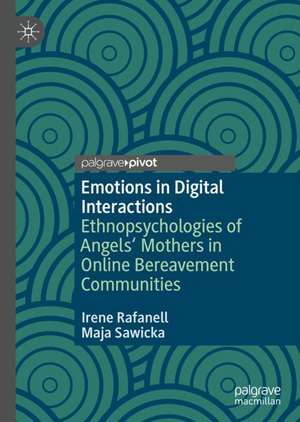Emotions in Digital Interactions: Ethnopsychologies of Angels' Mothers in Online Bereavement Communities
Autor Irene Rafanell, Maja Sawickaen Limba Engleză Hardback – 26 iul 2019
Preț: 383.50 lei
Nou
Puncte Express: 575
Preț estimativ în valută:
73.41€ • 79.76$ • 61.70£
73.41€ • 79.76$ • 61.70£
Carte tipărită la comandă
Livrare economică 21 aprilie-05 mai
Preluare comenzi: 021 569.72.76
Specificații
ISBN-13: 9783030219970
ISBN-10: 3030219976
Pagini: 113
Ilustrații: VIII, 120 p. 1 illus.
Dimensiuni: 148 x 210 mm
Greutate: 0.31 kg
Ediția:1st ed. 2020
Editura: Springer International Publishing
Colecția Palgrave Pivot
Locul publicării:Cham, Switzerland
ISBN-10: 3030219976
Pagini: 113
Ilustrații: VIII, 120 p. 1 illus.
Dimensiuni: 148 x 210 mm
Greutate: 0.31 kg
Ediția:1st ed. 2020
Editura: Springer International Publishing
Colecția Palgrave Pivot
Locul publicării:Cham, Switzerland
Cuprins
Chapter 1: Introduction.- Chapter 2: What Counts as Social "Reality?".- Chapter 3: Emotions as Products of the Social: Extrinsic Accounts.- Chapter 4: Emotions as Constitutive Methods: An Intrinsic Account of the Social.- Chapter 5: Emergence of Collectives as "Status Groups".- Chapter 6: Methodology and Methods of Data Collection.- Chapter 7: Emotional Deviance and New Emotional Reality.- Chapter 8: Concluding Points: Theoretical Models, Social Reality and Every-day "Practice".
Notă biografică
Irene Rafanell is Lecturer in Sociology at the University of the West of Scotland, UK, where she teaches on gender theory, sociology of the body, social theory and theories of power. She is an Honorary Fellow and a member of the Center for Research on Families and Relationships of the School of Social and Political Studies at Edinburgh University, UK. Her work explores the connections between social theory, social constructionism, sociology of knowledge and the body. Her book Sexed and Gendered Bodies as Social Institutions will be published by Palgrave. She is currently developing research on digital sociology and sociology of emotions analyzing digital communicative interactions.
Maja Sawicka is Assistant Professor at the Institute of Sociology of Warsaw University, Poland. In her work, she focuses on emotions perceived as social phenomena, investigating the links between culture, interactional group processes,and individual emotional experiences. She has a wide teaching experience in the field of Social Psychology and Qualitative Research Methods. She is the author of Emotions in Interactions in the Contemporary Polish Society (2018, in Polish).
Maja Sawicka is Assistant Professor at the Institute of Sociology of Warsaw University, Poland. In her work, she focuses on emotions perceived as social phenomena, investigating the links between culture, interactional group processes,and individual emotional experiences. She has a wide teaching experience in the field of Social Psychology and Qualitative Research Methods. She is the author of Emotions in Interactions in the Contemporary Polish Society (2018, in Polish).
Textul de pe ultima copertă
Combining the conceptual tools of interactionist and social constructionist positions, this book presents an in-depth investigation of emotions in digital interactions. Through the central case study of online bereavement communities for women who have suffered perinatal loss, this volume highlights the significance of affective sanctioning as constitutive of group dynamics and practice. The authors chart the emergence of a new ethnopsychology of motherhood—the category of ‘Angels’ Mothers’—arising from the localized practices of a community whose experience of grief is otherwise disenfranchised. Through their detailed theoretical exploration of the centrality of micro-situational dynamics, alongside the rich empirical illustration of collectively shared feeling rules and norms, Rafanell and Sawicka develop a naturalistic approach to the analysis of empirical data, providing insights for policy-making interventions.
Caracteristici
Offers new theoretical and analytical perspectives while providing practical implications for healthcare and counseling practitioners Presents a compelling example of using empirical, real-world case studies to analyze theoretical positions Contributes to discourse in digital sociology, sociology of emotions, sociological theory, and social psychology
